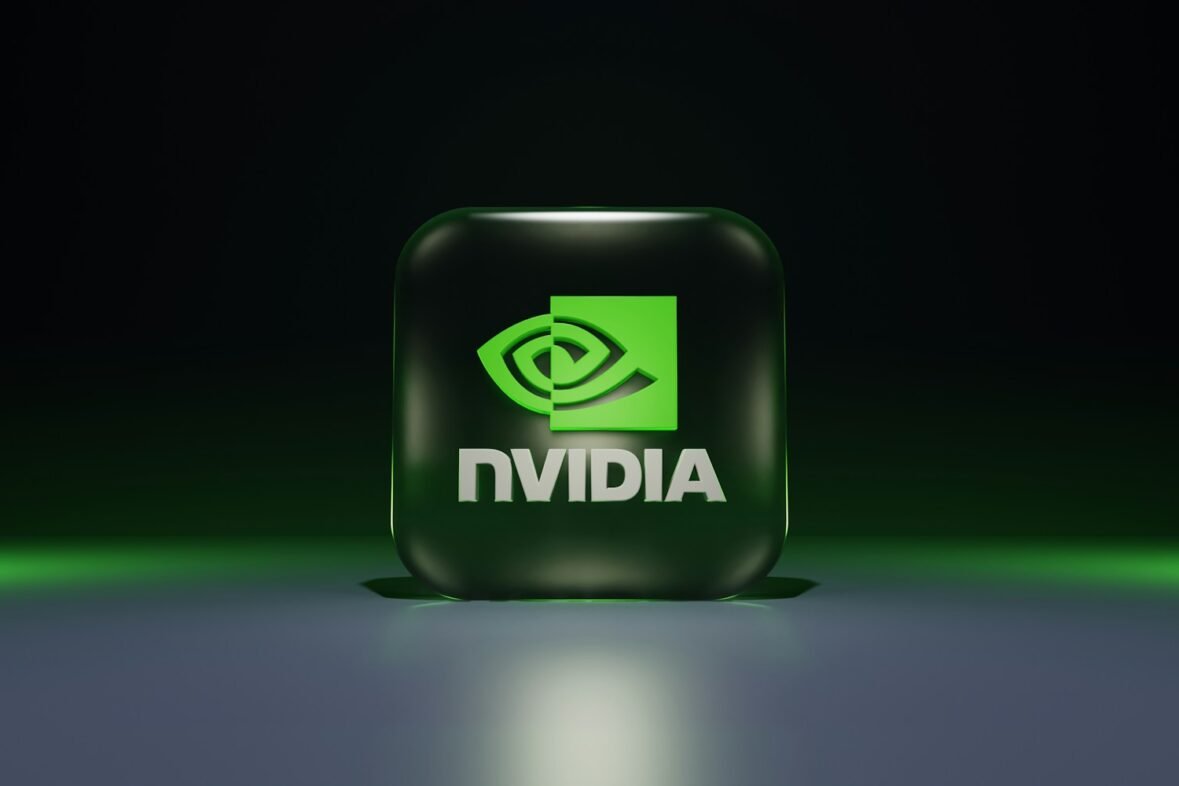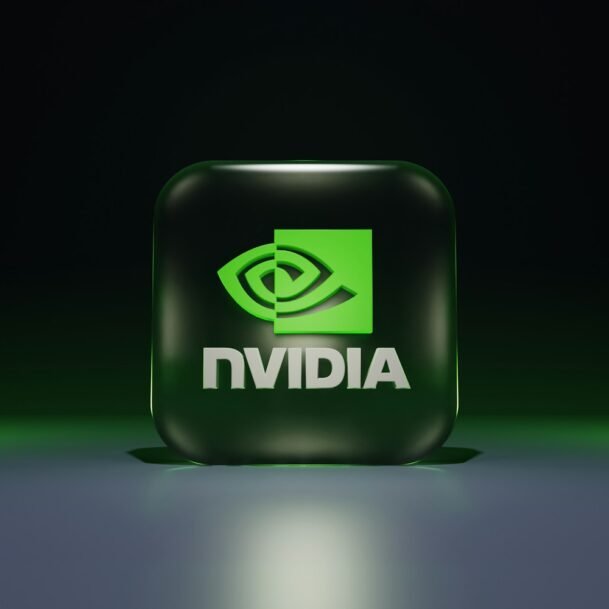The need for African innovation, is non-negotiable.
October 2025 • 8 min read • African Innovation & Strategy
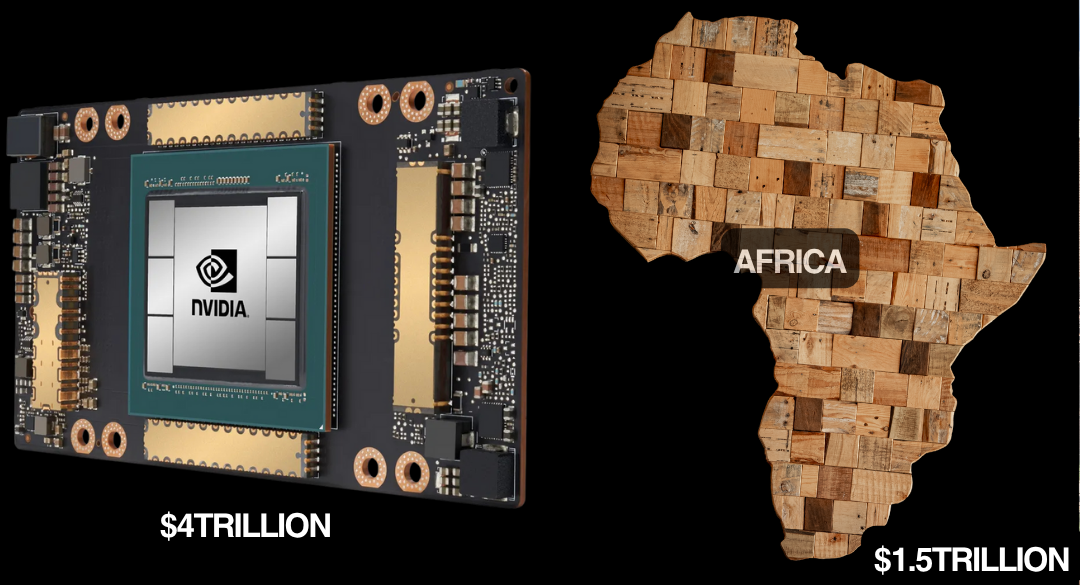
About a couple months ago, I was asked a question by a young entrepreneur from Lagos: “Collins, how do we compete when a single American chip company is worth three times more than our entire continent’s stock market?” My answer surprised him—and it might surprise you too. We don’t compete. We create what comes next.
Let me paint you a picture that should disturb your sleep. Nvidia, a company that started in a Denny’s restaurant with three engineers and a napkin in 1993, now commands a market valuation of $4 trillion. The combined stock market value of all 54 African nations? Just $1.55 trillion. This isn’t merely a statistic—it’s a mirror reflecting the most significant wealth transfer in human history, happening while most of us debate yesterday’s problems.
1 Company > 54 Nations
Nvidia’s $4 Trillion vs Africa’s $1.55 Trillion Market Cap
But here’s where my perspective diverges from the doomsayers and the hand-wringers. Through our work at Time Africa, connecting AfroNouveau trailblazers across the globe, I’ve witnessed something extraordinary. This gap isn’t our obituary—it’s our opportunity. The very disparity that makes headlines is actually the clearest signal of where unprecedented value creation awaits.
The Game Changed, But We’re Still Playing by Old Rules
Consider what Africa brings to the table: 1.4 billion people, 60% of the world’s uncultivated arable land, 30% of global mineral reserves, and the youngest population on Earth. Impressive? Absolutely. Sufficient for the new economy? Not even close.
Nvidia didn’t win by having more silicon in the ground. They won by making themselves indispensable to the future. They solved one critical problem—creating the chips that power artificial intelligence—and became essential to every company racing toward tomorrow. This is the lesson we must internalize: in the innovation economy, relevance trumps resources every single time.
“The question isn’t why Nvidia is worth $4 trillion. The question is: what will make Africa worth $40 trillion?”
From innovators from Johannesburg to San Francisco, from Nairobi to New York, I’ve observed a pattern. The winners in this new economy aren’t those with the most resources—they’re those who identify what the world cannot function without, then position themselves as the only solution.
The AfroNouveau Advantage Nobody’s Talking About
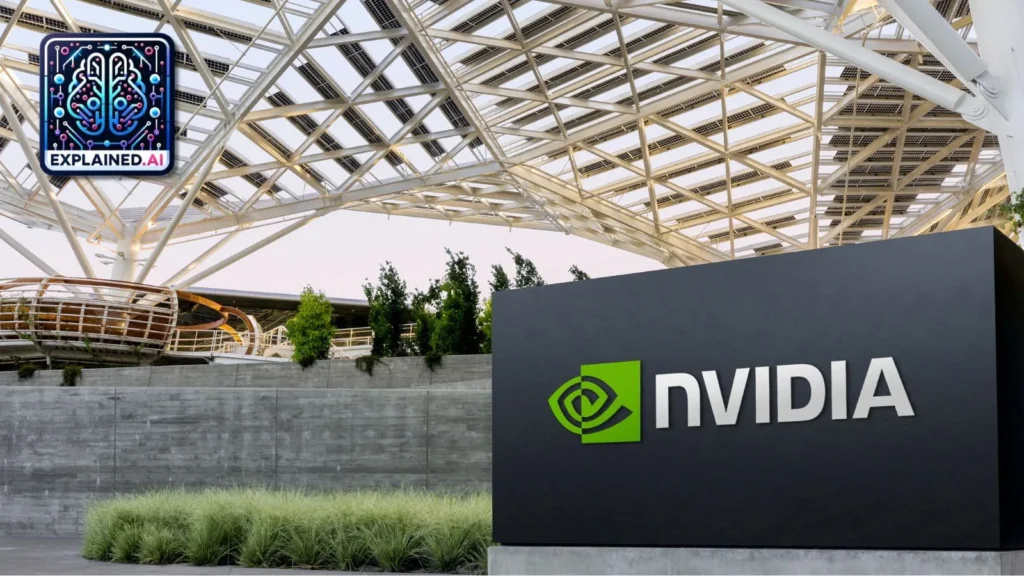
Here’s what the pessimists miss when they wring their hands about Africa’s position: we’re not behind—we’re perfectly positioned for the leapfrog. Let me explain with brutal clarity what we’ve learned as we build Time Africa’s network of global changemakers.
First, we have problems worth solving. While Silicon Valley optimizes advertisement algorithms, Africa faces existential challenges that, once solved, will transform humanity. Financial inclusion for 400 million unbanked adults. Healthcare delivery across impossible infrastructure. Agricultural innovation that could feed the world. These aren’t just problems—they’re trillion-dollar markets waiting for solutions.
Second, necessity has always been our superpower. M-Pesa didn’t emerge from Kenya because we had superior banking infrastructure—it emerged because we didn’t. Today, Kenya processes more of its GDP through mobile money than almost any nation on Earth. We don’t iterate on existing solutions; we invent entirely new categories.
Third, our diaspora is our secret weapon. I’ve connected with African professionals leading innovation at Google, running venture funds in London. This isn’t brain drain—it’s a global neural network waiting to be activated. When we unite continental hunger with diaspora expertise, we create an unstoppable force.
The Blueprint: From Spectators to Architects of Tomorrow

1. Identify the Invisible Infrastructure Stop building what exists. Start building what doesn’t exist but should. The next Nvidia won’t make chips—it will create something we don’t yet know we need but won’t be able to live without.
2. Build for the World, From Africa Your solution to Lagos traffic could revolutionize urban mobility globally. Your fix for rural healthcare access could transform medical delivery worldwide. Think local implementation, global application.
3. Collaborate Without Borders The old model was competition. The new model is collaboration. Connect with diaspora talent, partner with global innovators, build bridges not walls. At Time Africa, we’ve seen this formula create unicorns.
4. Own the Future Categories Don’t compete where they’re strong. Create categories where you’re the only player. Climate-smart agriculture. Inclusive fintech. Sustainable urbanization. These are our playing fields.
Why This Moment Is Different
The conversation has shifted. Five years ago, we discussed catching up. Today, we’re discussing leapfrogging. The infrastructure that held us back—or rather, its absence—now allows us to build for tomorrow without being shackled to yesterday’s systems.
The artificial intelligence revolution needs three things: data, problems to solve, and markets to serve. Africa generates more data daily than most realize—1.4 billion people living, transacting, creating. We have problems that AI must solve to prove its worth beyond chatbots and photo filters. And we represent the fastest-growing consumer market on the planet.
But here’s the critical insight most miss: we don’t need to build the next Nvidia. That game is won. We need to build what makes Nvidia irrelevant. The company that solves energy sustainably. The platform that makes traditional education obsolete. The system that reimagines healthcare from first principles.
The Time Africa Thesis: Connection Creates Wealth

Through Time Africa, I’ve had the privilege of spotlighting innovators who embody this new thinking. The founder in Rwanda building electric motorcycles that could revolutionize last-mile delivery globally. The team in Nigeria creating financial infrastructure that makes Western banking look antiquated. The innovator in South Africa developing agricultural AI that could end food insecurity.
These aren’t dreamers—they’re architects of the inevitable. They understand that the $4 trillion gap isn’t a wall; it’s a launching pad. They’re not trying to build African versions of American companies. They’re building the companies America will wish it had created.
“Every empire in history was built by those who saw tomorrow while others debated yesterday.”
The pattern is clear: connection accelerates innovation. When we link the software engineer in San Francisco with the problem-solver in Soweto, magic happens. When the venture capitalist in London meets the innovator in Lagos, capital finds purpose.
- This is why platforms matter.
- This is why community matters.
- This is why what we’re building at Time Africa matters.
Your Move in the $40 Trillion Future
So here’s my challenge to you, the one that I issue to every ambitious mind I encounter: What are you building that the world cannot function without?
Not what are you copying. Not what are you improving marginally. What are you creating that will make you indispensable to the future? Because while we’re having conferences about the digital divide, someone in a garage in Nairobi is building the bridge to tomorrow.
The tools are democratized. Cloud computing costs nothing to start. AI is open-source. Global markets are accessible from anywhere. The barriers that protected incumbent industries for decades have evaporated. What remains is the barrier in our minds—the one that says we must follow rather than lead.
The Choice Is Binary
You can be outraged by the $4 trillion gap, share the statistics, and return to business as usual. Or you can recognize this as the clearest signal of where value creation is heading and position yourself accordingly.
The Nvidia founders started with $40,000. Today, they’re worth $4 trillion. They didn’t have unique access to capital, special connections, or unfair advantages. They had clarity about where the world was heading and the courage to build for that future.
Africa’s moment isn’t coming—it’s here. But it won’t be captured by those waiting for permission or looking for validation. It will be seized by those who understand that the greatest fortunes are built during the greatest disruptions.
Building the AfroNouveau Economy
Let me be direct about what’s required. This isn’t about positive thinking or motivational rhetoric. This is about systematic execution of a new playbook. The AfroNouveau economy we’re building at Time Africa isn’t just about creating wealth—it’s about redefining how wealth is created.
First, we must shed the employee mindset. The future belongs to builders, not job seekers. Every young African with a smartphone has more computing power than NASA had when they put humans on the moon. The question is: what moon shot are you pursuing?
Second, we must think in networks, not hierarchies. The old model was vertical—climbing ladders, seeking approval, waiting your turn. The new model is horizontal—building connections, creating value, making yourself essential. Your network is your net worth, but more importantly, it’s your launching pad.
Third, we must embrace radical collaboration. The rivalry between African nations, cities, and tribes is a luxury we cannot afford. While we compete among ourselves, the world races ahead. The choice is stark: collaborate or become irrelevant.
The Uncomfortable Truth About Timing
Here’s what keeps me up at night: we have a window, but it’s not infinite. The technological revolution is accelerating exponentially. The companies being built today will dominate the next century. The infrastructure being laid now will determine who prospers and who merely survives.
In my conversations with global investors, one theme emerges repeatedly: they’re looking for the next frontier. They’ve maximized returns in mature markets. They’re seeking exponential growth. Africa represents the last untapped market of scale, but they won’t wait forever.
This is why Time Africa exists—to spotlight the builders, connect the innovators, and accelerate the timeline. We’re not just telling stories; we’re creating the narrative that attracts capital, talent, and opportunity. Every trailblazer we feature, every connection we facilitate, every collaboration we enable brings us closer to the tipping point.
“The difference between those who shaped history and those who were shaped by it was always the same: the courage to act while others analyzed.”
The $4 Trillion Question Answered
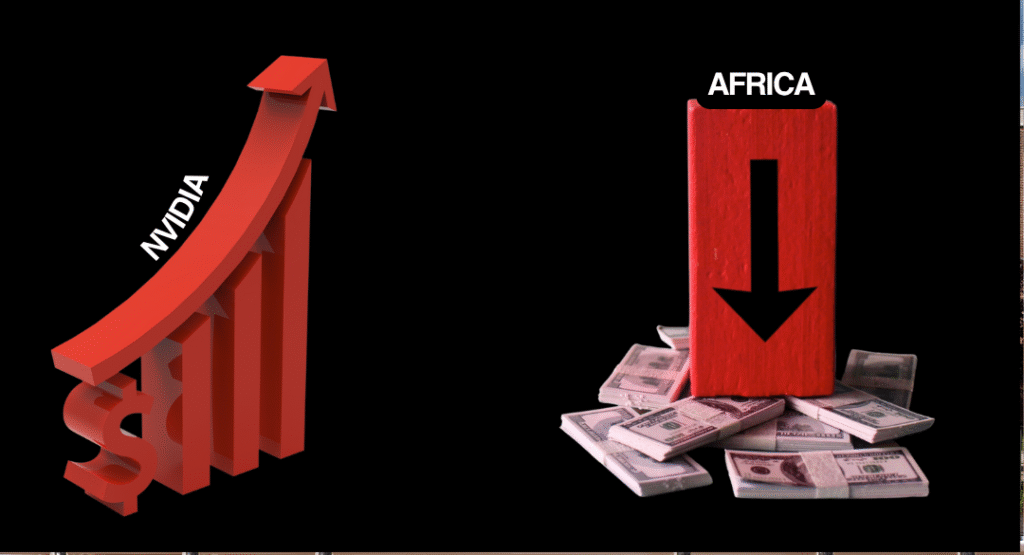
So, what will you do with this information? Will you see Nvidia’s $4 trillion valuation as proof of what’s possible or evidence of what’s impossible for Africa? Your answer will determine not just your future, but your contribution to the continent’s trajectory.
I’ve shared the blueprint. The patterns are clear. The opportunity is unprecedented. The tools are available. The network exists—Time Africa and platforms like The Alt are building the bridges daily. What’s missing isn’t resources, connections, or opportunities. What’s missing is execution.
The entrepreneurs I spotlight through Time Africa aren’t waiting for perfect conditions. They’re building in the storm. They understand that by the time everyone agrees it’s possible, the opportunity will have passed. They’re creating the future while others debate its possibility.
What is Your Next Move?
Let me close with tactical clarity. Your wealth—and Africa’s—won’t come from competing in saturated markets. It will come from creating new categories. Here’s your action plan:
This week: Identify one problem you face daily that technology hasn’t solved. That’s not a frustration—it’s a business opportunity worth exploring.
This month: Connect with three people building in your space—one local, one continental, one global. Your breakthrough will come from unexpected collaborations.
This quarter: Start building something. Anything. A prototype, a community, a solution. Perfect is the enemy of progress, and progress is what creates moguls.
This year:
Position yourself in the new economy. Whether you’re building, investing, or enabling, make yourself essential to Africa’s innovation ecosystem.
The $4 trillion gap between Nvidia and Africa isn’t just a statistic—it’s a beacon. It shows us exactly where value is being created and, more importantly, where it will be created next. The question isn’t whether Africa will produce trillion-dollar companies. The question is whether you’ll be part of building them.
The Phenomenal team at Time Africa, we’re not just observers of this transformation—we’re catalysts. Every story we tell, every innovator we spotlight, every connection we facilitate accelerates the timeline. The AfroNouveau economy isn’t a concept—it’s a movement, and movements are built by those who move.
The choice, as always, is yours. You can read this, feel inspired, and return to the status quo. Or you can recognize this as your call to action—your invitation to stop watching history and start making it.
Nvidia started with three people and an idea. Today, they’re worth more than a continent. But remember: every empire eventually meets its successor. The question is: are you building what comes next?
The world is waiting for what Africa will build. More importantly, Africa is waiting for what you will build. The infrastructure is ready. The capital is looking. The market is hungry. The only question remaining is the one I started with, the one that determines everything:
What will you do with this information?
Collins Ero — is a thought leader, a cultural architect at the intersection of tech, culture, and agency. Founder, TIME AFRICA. Creator, AfroNouveau.




